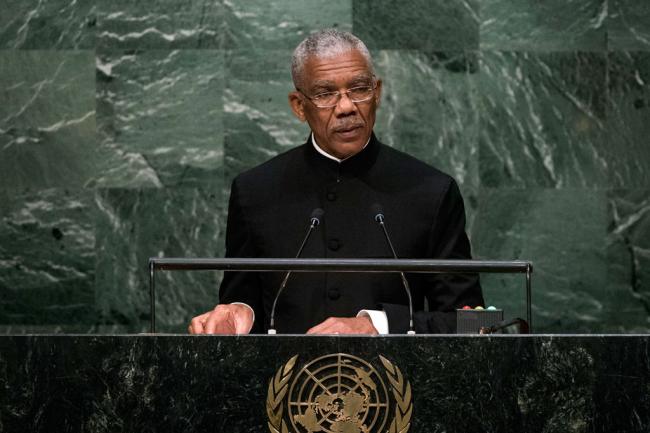
President of Guyana urges UN to protect small States from foreign aggression
In a statement to the UN General Assembly’s annual high-level debate, David Arthur Granger focused solely on his country’s long-simmering territorial dispute with neighbouring Venezuela – an issue he said was actually settled 116 years ago.
He said, “The whole world – except the Bolivarian Republic of Venezuela – accepts our borders,” he declared.
“For fifty years, our small country has been prevented from fully exploiting our rich natural resources. Venezuela has threatened and deterred investors and frustrated our economic development,” he said.
He emphasized that Guyana’s territorial integrity is being violated by Venezuela, “which has occupied a part of our territory, the most recent incident being on 10 October 2013, when it sent a naval corvette into our maritime zone and expelled a peaceful, petroleum exploration vessel which was conducting seismic surveys.”
Quoting a UN General Assembly resolution adopted some 20 years ago, President Granger said that despite such international decisions and attempts at arbitration, Venezuela had promulgated “spurious decrees” claiming Guyana’s territory, the most recent being on May 26th, 2015, our independence anniversary, when Venezuela issued a decree with specified coordinates purporting to annex almost our entire maritime zone.
“That decree constituted a reassertion of its claim to five of Guyana's ten regions,” he declared, rejecting claims by Venezuela which he said are in defiance of international law.
He added, “Guyana resists Venezuela's acts of aggression in defiance of the Charter of the United Nations which prescribes the peaceful settlement of disputes and proscribes the use of armed force.”
He said Venezuela is unsettling a settled border. “It is destabilizing a stable region of the globe by the use of armed force against a peaceful, small State. Venezuela has retarded Guyana's development by threats that are intended to force a small state to yield its birthright,” he continued.
He added that Venezuela's expansionist ambitions cannot be allowed to unsettle the principle of inviolability of borders, undermine the tenets of international law and unravel borders which have been undisturbed for decades.
Renewing Guyana’s pledge to continue pursuing the path of peace, he said Guyana does not wish for Venezuela’s “obnoxious territorial claim” to obscure the prospects of peace and obstruct the possibility of growth for the next 50 years.
He added, “We need a permanent solution in order to avoid the fate of perpetual peril and penury. Guyana seeks a juridical settlement to this controversy.”
Granger said Guyana reposes its faith and places its fate in the international system of peace that was promised by the Charter of the United Nations 70 years ago.
“We want to bring an end to Venezuelan aggression. We want to develop our country, all of our country, in accordance with international law,” he declared, calling upon the UN to give “real meaning” its Assembly resolution of 9 May 1994 by establishing a collective security system not merely to "monitor' but, more so, 'maintain' the security of small States.
UN Photo/Cia Pak
Support Our Journalism
We cannot do without you.. your contribution supports unbiased journalism
IBNS is not driven by any ism- not wokeism, not racism, not skewed secularism, not hyper right-wing or left liberal ideals, nor by any hardline religious beliefs or hyper nationalism. We want to serve you good old objective news, as they are. We do not judge or preach. We let people decide for themselves. We only try to present factual and well-sourced news.







